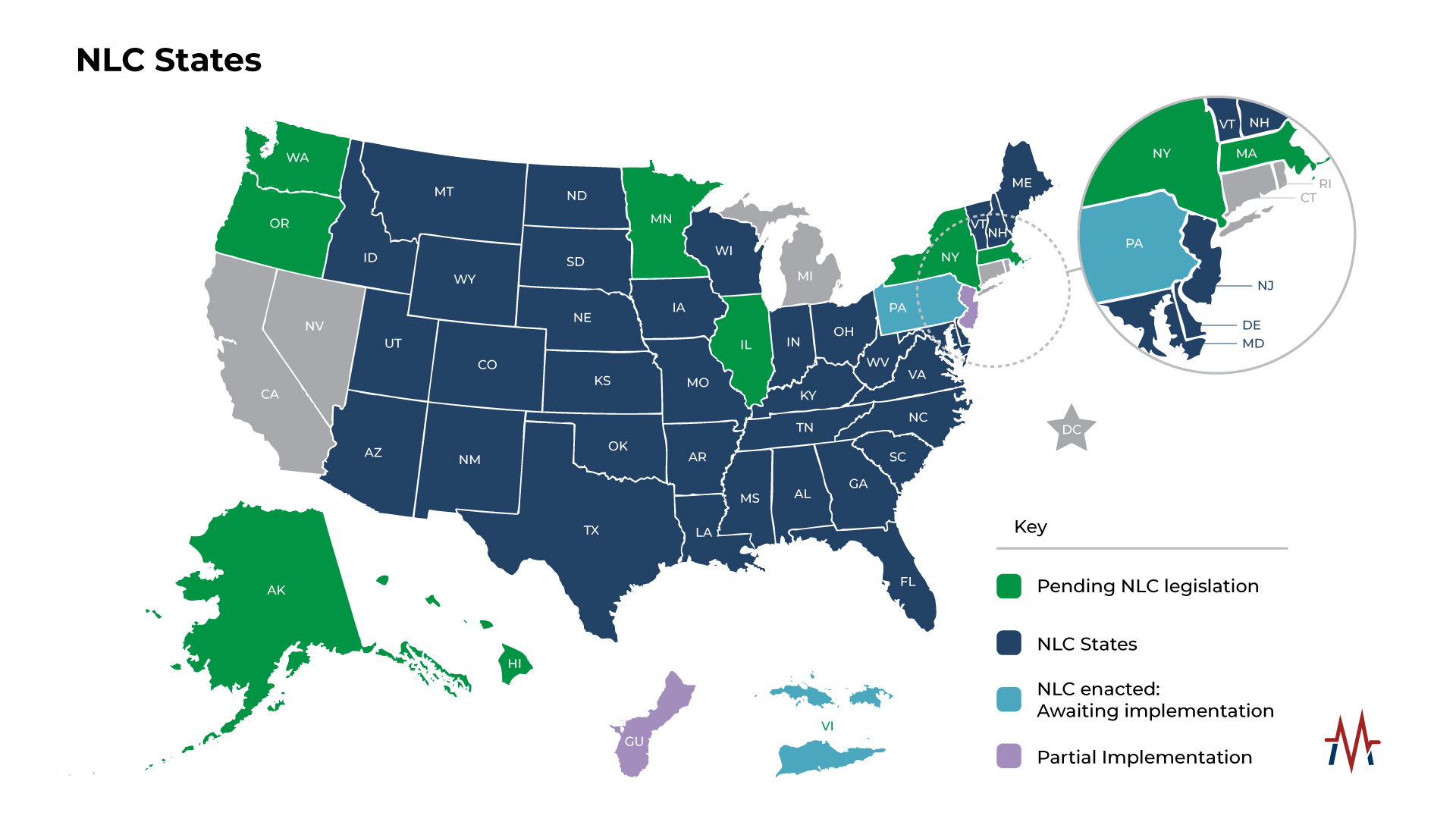
State Licensing for Travel Nurses
As a travel nurse, you’ll obtain many different state licenses throughout your career and have many questions on nurse licensing. Some states are much easier to get licensure in than others, so you’ll want to plan ahead for assignments. Talk with your recruiter to create a game plan of where and when you’ll want to travel to different states.
Nurse Licensing for Travel Nurses
As a travel nurse, you’ll obtain many different state licenses throughout your career and have many questions on nurse licensing. Some states are much easier to get licensure in than others, so you’ll want to plan ahead for assignments. Talk with your recruiter to create a game plan of where and when you’ll want to travel to different states.


Compact State Licenses
A compact license for nurses refers to the Nurse Licensure Compact (NLC), which is an agreement among participating states in the United States. This compact allows registered nurses (RNs) and licensed practical/vocational nurses (LPN/VNs) to have one multistate license, which grants them the ability to practice in their home state as well as other compact states.
Key points about the compact license for nurses (NLC):
Multistate Privileges: Nurses with a compact license can practice physically or via telehealth in any compact state without needing to obtain additional licenses.
Home State Requirement: The nurse must be a resident of a compact state to hold a compact license.
Cross-State Practice: This facilitates easier mobility and flexibility for nurses to work across state borders, especially beneficial in regions where neighboring states participate in the compact.
Disciplinary Rules: Nurses are subject to the nursing practice laws and regulations of the state where the patient is located at the time of care.
Non-Compact States: Nurses from non-compact states must obtain a license from each state where they wish to practice.
Compact State Licenses
A compact license for nurses refers to the Nurse Licensure Compact (NLC), which is an agreement among participating states in the United States. This compact allows registered nurses (RNs) and licensed practical/vocational nurses (LPN/VNs) to have one multistate license, which grants them the ability to practice in their home state as well as other compact states.
Key points about the compact license for nurses (NLC):
Multistate Privileges: Nurses with a compact license can practice physically or via telehealth in any compact state without needing to obtain additional licenses.
Home State Requirement: The nurse must be a resident of a compact state to hold a compact license.
Cross-State Practice: This facilitates easier mobility and flexibility for nurses to work across state borders, especially beneficial in regions where neighboring states participate in the compact.
Disciplinary Rules: Nurses are subject to the nursing practice laws and regulations of the state where the patient is located at the time of care.
Non-Compact States: Nurses from non-compact states must obtain a license from each state where they wish to practice.
eNLC Member States
An Enhanced Nurse Licensure Compact (eNLC) state is a participating state in the compact state alliance, allowing any nurse who resides in one to practice in 42 jurisdictions with nurse licensing. (6-2024) To be eligible for the eNLC, you must have proof of residency in one of the compact states as well as a current RN license in that state.
eNLC Member States
An Enhanced Nurse Licensure Compact (eNLC) state is a participating state in the compact state alliance, allowing any nurse who resides in one to practice in 42 jurisdictions with nurse licensing. (6-2024) To be eligible for the eNLC, you must have proof of residency in one of the compact states as well as a current RN license in that state.
Alabama
Arizona
Arkansas
Colorado
Connecticut
Delaware
Florida
Georgia
Guam*
*Guam is allowing nurses who hold active, unencumbered, multi-state licenses issued by Nurse Licensure Compact member states to practice in Guam under their multi-state licenses.
Idaho
Indiana
Iowa
Kansas
Kentucky
Louisiana
Maine
Maryland
Mississippi
Missouri
Montana
Nebraska
New Hampshire
New Jersey
New Mexico
North Carolina
North Dakota
Ohio
Oklahoma
Pennsylvania (Partial)
Rhode Island
South Carolina
South Dakota
Tennessee
Texas
Utah
Vermont
Virginia
Virgin Islands (TBD)
Washington
West Virginia
Wisconsin
Wyoming



